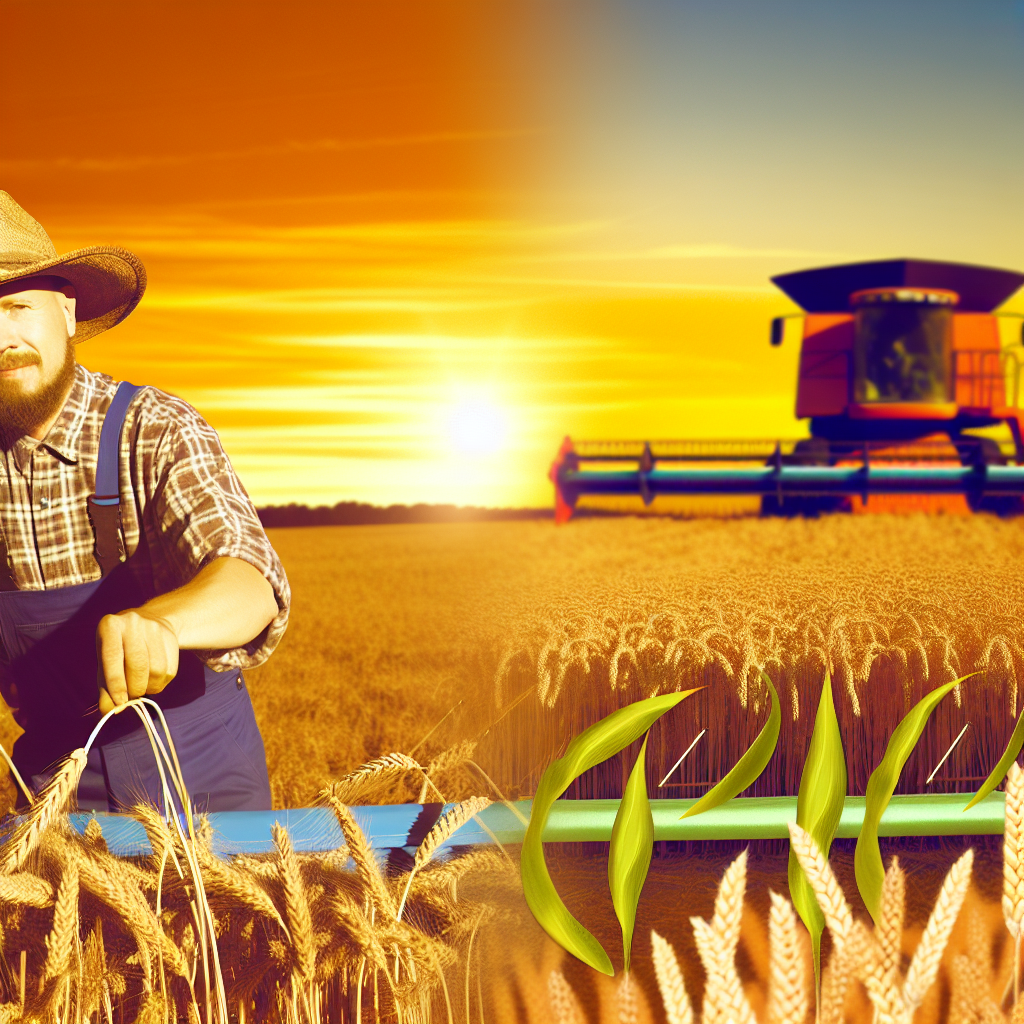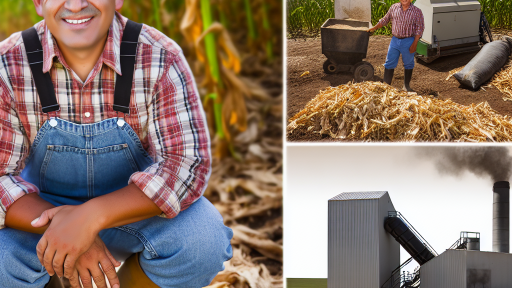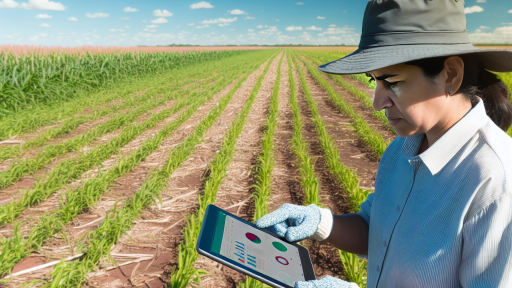Overview of GMO Crops
Definition of GMO Crops
Genetically Modified Organisms, or GMOs, refer to organisms whose genetic material has been altered.
This alteration is achieved through genetic engineering techniques.
The primary goal is to achieve specific traits or characteristics.
For example, scientists may engineer crops for pest resistance or drought tolerance.
Types of GMO Crops
There are several types of GMO crops available on the market today.
- Insect-Resistant Crops: These crops contain genes that produce proteins toxic to specific insects.
- Herbicide-Tolerant Crops: These have been modified to withstand certain herbicides.
- Nutritionally Enhanced Crops: These crops are engineered to improve nutritional content.
Corn and soybeans are among the most commonly grown GMO crops.
Additionally, cotton and canola are also widely cultivated.
Farmers choose these crops for their increased yield and reduced need for chemical inputs.
Benefits of GMO Crops
GMO crops offer numerous advantages to farmers and consumers.
- Increased Crop Yields: Farmers can grow more food on the same amount of land.
- Reduced Use of Pesticides: Many GMO crops are resistant to pests, decreasing pesticide reliance.
- Improved Food Security: With higher yields, GMO crops can help feed growing populations.
Moreover, they can enhance environmental sustainability by reducing agricultural impacts.
Farmers appreciate these benefits as they face challenges from climate change and population growth.
Challenges and Controversies
Despite their benefits, GMO crops face challenges and controversies.
- Public Awareness: Many people remain unaware of the science behind genetic modification.
- Regulation and Labeling: Countries have different regulations regarding GMO products.
- Environmental Concerns: Some worry about the ecological impact of GMO crops.
Balancing public concerns while promoting agricultural innovation is essential.
Understanding GMO crops is vital as they increasingly integrate into traditional farming systems.
Benefits of Integrating GMO Crops in Traditional Farming
Enhanced Crop Yields
Integrating GMO crops can significantly enhance crop yields.
Transform Your Agribusiness
Unlock your farm's potential with expert advice tailored to your needs. Get actionable steps that drive real results.
Get StartedThese crops often exhibit improved resistance to pests and diseases.
As a result, farmers can harvest more produce per acre.
This increased productivity benefits food supply and farmer income.
Reduced Chemical Use
GMO crops can lead to reduced reliance on chemical pesticides.
By using genetic modifications, crops can repel pests naturally.
Consequently, this practice promotes a healthier environment.
Farmers can also save on costs associated with chemical inputs.
Improved Resource Efficiency
The integration of GMO crops can enhance resource efficiency.
Many GMO varieties require less water compared to traditional crops.
This trait is particularly beneficial in drought-prone regions.
Moreover, certain varieties can thrive in poorer soil conditions.
Contribution to Food Security
GMO crops play a crucial role in improving global food security.
They can be engineered to grow in diverse environments.
This adaptability helps ensure a stable food supply.
Furthermore, increased resilience against climate change challenges is possible.
Economic Advantages for Farmers
Farmers can experience significant financial benefits from GMO integration.
Higher yields lead to increased profitability over time.
In addition, reduced input costs make farming more sustainable.
This economic stability encourages investment in better farming practices.
Challenges and Concerns in GMO Adoption
Public Perception
Public opinion on GMO crops varies widely across different regions.
Many consumers express concerns about the safety of GMO foods.
Furthermore, misinformation can exacerbate negative perceptions.
Engagement with communities is crucial for educating the public.
Regulatory Hurdles
GMO crops face stringent regulatory scrutiny in many countries.
Showcase Your Farming Business
Publish your professional farming services profile on our blog for a one-time fee of $200 and reach a dedicated audience of farmers and agribusiness owners.
Publish Your ProfileApproval processes can be lengthy and complex.
These regulations may slow down the adoption of biotechnology.
Moreover, compliance costs can be significant for farmers.
Environmental Concerns
Environmental risks associated with GMO crops often arise in discussions.
Some worry about potential impacts on biodiversity.
Additionally, the emergence of herbicide-resistant weeds poses challenges.
Proper management practices can mitigate these environmental risks.
Economic Considerations
The economic implications of adopting GMO crops are significant for farmers.
Initial investments in GMO seeds may be higher than traditional seeds.
However, higher yields can result in greater long-term profitability.
Farmers must weigh the costs and benefits carefully.
Ethical Issues
Ethical considerations about genetic modification raise important questions.
Some consumers question the morality of altering genetic material.
Discussions about food sovereignty link closely to GMO debates.
Respecting diverse viewpoints is essential in these discussions.
You Might Also Like: Top Features To Look For In Farm Management Software Solutions
Case Studies: Successful Integration of GMO Crops
Diverse Crop Systems
The integration of GMO crops into diverse crop systems shows great promise.
Farmers have reported increased yields with these crops.
For instance, Lauren Fields in Michigan adopted GMO soybeans.
She observed a 30% increase in her yield compared to non-GMO varieties.
This change positively impacted her overall profit margins.
Resistance to Pests
Another notable success story comes from the Anderson Farm in Texas.
This farm implemented GMO cotton to manage pest resistance.
The results were impressive, as pest-related losses decreased significantly.
Farm manager David Anderson noted a 50% reduction in pesticide use.
This change benefited both the environment and the farm’s profitability.
Soil Health Improvement
Integrating GMO crops also contributes to improved soil health.
The Green Valley Cooperative adopted GMO corn for this reason.
Farmers reported enhanced nitrogen fixation in the soil.
This improvement led to healthier plants and higher overall yields.
Additionally, regenerative practices complemented their use of GMO seeds.
Economic Benefits
Rural economies benefit significantly from integrating GMO crops.
For example, the Smith Family Farms in Iowa increased their operational efficiency.
They diversified their offerings by incorporating GMO alfalfa into their system.
This strategic decision created new revenue streams for the family business.
Consequently, local suppliers and agribusinesses also saw economic boosts.
Adoption of Sustainable Practices
The use of GMO crops encourages sustainable agricultural practices.
Farmers like Greg Taylor in Illinois promote minimal tillage systems.
GMO varieties allow him to reduce soil disturbance significantly.
This practice contributes to carbon sequestration and soil conservation.
Showcase Your Farming Business
Publish your professional farming services profile on our blog for a one-time fee of $200 and reach a dedicated audience of farmers and agribusiness owners.
Publish Your ProfileMoreover, it enhances long-term productivity and resilience against climate change.
Explore Further: Optimizing Crop Investments Through Advanced Agri-Fintech Platforms
Best Practices for Farmers: Balancing GMO and Traditional Methods
Understanding the Role of GMO Crops
GMO crops can enhance agricultural efficiency.
They offer resistance to pests and diseases.
Farmers should evaluate the specific benefits they provide.
Using GMOs can lead to higher yield potential.
Thus, understanding these advantages is crucial.
Combining Techniques for Maximum Output
Farmers should integrate GMO and traditional methods carefully.
This combination can bolster resilience against climate variability.
Employ crop rotation to maintain soil health.
Additionally, consider using organic practices alongside GMOs.
Such strategies encourage biodiversity on farms.
Engaging with Local Communities
Building relationships with local communities fosters collaboration.
Farmers can share experiences with GMO usage.
This helps address concerns surrounding GMOs.
Community engagement can lead to supportive networks.
Education plays a key role in promoting understanding.
Monitoring and Adaptation
Farmers should continuously monitor their crop performance.
Data collection helps inform future decisions.
It is vital to adapt practices over time.
Flexibility allows farmers to respond to changing conditions.
Implementing feedback loops will enhance future strategies.
Implementing Sustainable Practices
Employ sustainable farming practices with GMO integration.
This ensures long-term viability of farming systems.
Reduce chemical inputs wherever possible.
Utilize cover crops to protect soil integrity.
Merging these approaches benefits both the economy and environment.
Ensuring Compliance and Best Standards
Farmers must stay informed about regulations regarding GMOs.
Compliance with local laws is essential.
Foster transparency with consumers about farming practices.
Engaging in best practices builds trust within the market.
Finally, consider certifications that advocate for sustainable methods.
Learn More: Maximizing Profitability With Automated Farming Equipment

Regulations and Compliance in Using GMO Crops
Understanding the Regulatory Framework
Regulations for GMO crops vary significantly across countries.
Governments impose strict guidelines to ensure safety.
Farmers must navigate these regulations to remain compliant.
In the United States, the USDA oversees GMO crop evaluation.
The FDA and EPA also play critical roles in GMO regulation.
Navigating Compliance Procedures
Compliance requires thorough research and documentation.
Farmers must submit applications for GMO crop approval.
Showcase Your Farming Business
Publish your professional farming services profile on our blog for a one-time fee of $200 and reach a dedicated audience of farmers and agribusiness owners.
Publish Your ProfileThe documentation includes environmental impact assessments.
Moreover, effective tracking of GMO products is essential.
This tracking ensures that the crops meet regulatory standards.
Labeling Requirements
GMO crops often have specific labeling requirements.
These requirements vary by region and product type.
In some areas, clear labeling helps inform consumers.
It is vital for farmers to adhere to these labeling laws.
Failure to comply can result in significant fines or penalties.
Best Practices for Compliance
Implementing best practices enhances compliance success.
Farmers should keep accurate records of all GMO crop activities.
Regular audits and reviews can identify potential compliance issues.
Additionally, training staff on regulations ensures adherence.
Utilizing legal counsel can help navigate complexities in the law.
Staying Informed on Regulatory Changes
Regulations regarding GMO crops frequently evolve.
Farmers must stay updated on changes in the law.
Joining agricultural associations can provide valuable resources.
Attending workshops and conferences aids in understanding new regulations.
Moreover, subscribing to industry publications keeps farmers informed.
Uncover the Details: Leveraging Blockchain To Reduce Costs In Agricultural Supply Chains
Environmental Impact of GMO Crop Integration
Benefits of GMO Integration
Integrating GMO crops can enhance crop yields significantly.
These crops often resist pests and diseases more effectively.
Additionally, GMO crops require fewer chemical inputs in some cases.
This reduces the overall environmental footprint of farming operations.
Furthermore, these crops can thrive in challenging conditions.
For instance, drought-resistant GMO varieties conserve water resources.
As a result, farmers can maintain productivity even in adverse weather.
Potential Environmental Risks
Despite their benefits, GMO crops can pose environmental risks.
One concern involves the unintentional spread of traits to wild relatives.
This gene flow can disrupt local ecosystems.
Moreover, over-reliance on GMO crops may lead to increased pest resistance.
Consequently, farmers might need additional chemical treatments.
This shift can negate some environmental benefits of GMO technology.
Soil Health and Biodiversity
Integrating GMO crops can affect soil health positively and negatively.
On one hand, reduced chemical usage may improve soil ecosystems.
On the other hand, monocropping associated with GMO crops can diminish biodiversity.
This limited plant diversity can harm soil microbial communities.
Healthy soils are crucial for sustainable agricultural production.
Regulatory and Monitoring Measures
Effective monitoring of GMO crop integration is essential for environmental safety.
Regulatory frameworks help assess ecological impact and manage risks.
This can include long-term ecological studies and risk assessments.
Showcase Your Farming Business
Publish your professional farming services profile on our blog for a one-time fee of $200 and reach a dedicated audience of farmers and agribusiness owners.
Publish Your ProfileSuch measures ensure that the benefits of GMO crops do not come at a high cost.
Moreover, transparent labeling allows consumers to make informed choices.
Future Considerations
The integration of GMO crops into traditional farming requires careful planning.
Farmers should weigh the ecological advantages against potential drawbacks.
Research into sustainable practices can aid in this decision-making process.
Collaboration among stakeholders can enhance ecological outcomes.
In the end, integrating GMO crops requires a balanced approach to environmental stewardship.
Future Trends: The Role of Technology in GMO Farming Systems
Advancements in Genetic Engineering
Genetic engineering technologies continue to evolve rapidly.
These advancements allow for more precise modifications in crops.
As a result, producers can enhance traits like yield and resilience.
Moreover, emerging techniques, such as CRISPR, show great promise.
CRISPR allows for targeted changes without introducing foreign DNA.
Data-Driven Agriculture
Data analytics plays a significant role in modern farming.
Farmers use data to inform decisions about crop management.
This includes monitoring weather patterns and soil health.
Utilizing data improves efficiency and reduces resource waste.
Furthermore, real-time data leads to better pest and disease management.
Integration of IoT Devices
The Internet of Things (IoT) enhances farming practices.
Devices such as sensors monitor crop conditions continuously.
This technology provides farmers with actionable insights.
As a result, they can take timely actions to mitigate issues.
IoT devices also help optimize irrigation and fertilizer use.
Precision Agriculture Techniques
Precision agriculture involves tailored farming practices.
This approach maximizes output while minimizing input costs.
Farmers use GPS technology to track and manage field variability.
Consequently, they can apply resources exactly where needed.
This method enhances sustainability and reduces environmental impact.
Collaborative Robotics in Farming
Robots and automation are increasingly prevalent in agriculture.
Collaborative robots work alongside human laborers effectively.
These robots perform tasks like planting and harvesting.
Consequently, they increase efficiency and reduce labor costs.
Additionally, automation can lower the risk of human error.
Future Adoption and Acceptance
Adoption of GMO technology continues to grow globally.
Public perception remains a significant factor in this trend.
Educational initiatives are critical for addressing misconceptions.
As awareness increases, acceptance of GMO crops may expand.
Ultimately, technology will play a crucial role in future farming systems.
Additional Resources
The Environmental Impact of Genetically Modified Crops – Health …
The impact of Genetically Modified (GM) crops in modern agriculture …




